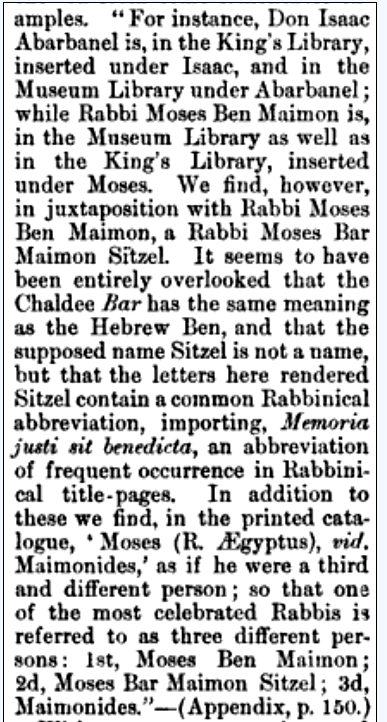
The appendix referred to is, sadly, not online (yet) but is called the 'Appendix to the Report of the Commissioners appointed to inquire into the Constitution and Management of the British Museum.' This report (and appendix) was issued in 1850. Matters concerning Hebrew (excuse me, Oriental) books were written by the Hebraist Christian Heinrich Friedrich Bialoblotzky (1799-1869). The aforementioned Bialloblotzky was referred to by a contemporary as "a converted Polish Jew, of portentous learning and amazing subtlety and minuteness of familiarity with the sacred languages." He was also the translator of The chronicles of Rabbi Joseph ben Joshua ben Meir, the Sphardi in two volumes, the עמק הבכא of Yoseph Hakohen.
As you can see, here he touched upon a very real problem. Many people - and not just Jews and other "Orientals" - were known by a few different names. How do you pick one, how do you make sure there aren't multiple entries for the same person, and how do you avoid embarrassing errors like "Rabbi Moses Bar Maimon Sitzel" (זצ"ל) when dealing with thousands and thousands of books?
The reviewer of the Appendix put the problem into broader context thusly: "In the sixteenth and seventeenth centuries people were sadly ashamed of their own vernacular names, and would have them transferred into either Latin or Greek. A certain German whose family inherited the name of Sch warzerd or Black earth, was so ashamed of its barbarism that he had its meaning translated into Greek, and so gave distinction to the name of Melanchthon."
Strangely enough, the ultimate suggestion proposed was to carefully apply a consonant by consonant rendering as best as the English alphabet could support, but "the vowels will be taken in their Italian value." Huh? This would "would decide the question whether we should write Zacut, or Socuto, or Zacuto; Moses, Mose, Mosche, or Mosce; Quimchi or Kimchi ; Mishnah or Meshne."
Who knew bibliography could be so amusing?
